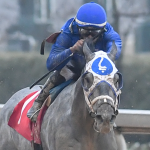
Preakness Quick Sheet: Get to Know the 2021 Preakness Horses

In 1970, Arthur B. Hancock III stepped out to extend his family’s already considerable influence on the Thoroughbred world in central Kentucky by assuming managing duties of Stone Farm in Paris, north of Lexington. The Hancock family was renowned for growing nearby Claiborne Farm into a leading breeding and racing entity in Kentucky through two prior generations under the guidance of Arthur B. Hancock and Arthur B. “Bull” Hancock Jr. Nearly 50 years down the line, Stone Farm has established its own legacy through Arthur Hancock III’s stewardship, and it’s been represented at the sport’s highest levels by Kentucky Derby and Breeders’ Cup winners.
After assuming ownership of Stone Farm, Hancock gradually grew the operation, adding acres of land and building a stallion roster and broodmare band. A product of Hancock’s breeding strategy, Gato del Sol, won the 1982 Kentucky Derby for Stone Farm and co-owner Leone Peters, enabling further expansion. Six years later, Hancock and Peters were represented once again on the Triple Crown trail with 1988 Preakness Stakes and Belmont Stakes winner Risen Star, the Eclipse Award winner as champion 3-year-old male that year.
And a year after that, the legendary Sunday Silence, a son of Stone Farm sire Halo raised at the farm and co-owned by Hancock with partners, won the Kentucky Derby, Preakness, and Breeders’ Cup Classic, defeating Claiborne-raised rival Easy Goer in all three races. He was voted champion 3-year-old male and Horse of the Year for 1989, and entered racing’s Hall of Fame in 1996.

Stone Farm stars during the 1990s included Kentucky Derby runners-up Strodes Creek (homebred [bred and owned] by Stone Farm, second in 1994) and Menifee (bred and co-owned by Stone Farm, second in 1999). Menifee went on to stand at stud for Hancock during the early 2000s.
In 1998, Stone Farm and Stonerside Stable brought a yearling they’d bred to the Keeneland July auction and sold the colt to Japan’s Fusao Sekiguchi for the event’s top price of $4 million. That son of Claiborne stallion Mr. Prospector would eventually be named Fusaichi Pegasus and win the 2000 Kentucky Derby.
Stone Farm’s success continues to this day – they’ve been represented in recent years by such stakes winners in North America and Europe as Wanderin Boy (homebred), European champion filly Rainbow View (raised), Upperline (co-owned), European champion colt Air Force Blue (bred), Mastery (bred), and 2017 Grade 1 Manhattan Stakes winner Ascend (bred and co-owned).
Surrounded by acres of picturesque Kentucky bluegrass landscapes, Stone Farm offers comprehensive care during breeding season, which continues throughout the time foals are brought up at the farm and then possibly sold at auction (the farm only offers horses that it has raised). As Arthur Hancock III’s motto goes, “We’re trying to raise you a good horse.”
Tours of Stone Farm are year-round by appointment and can be reserved through Horse Country at this link. During the summer, visitors will visit yearlings as they are prepped for the upcoming auctions at Fasig-Tipton and Keeneland, and fall visitors may view young horses as they take their first training lessons. As part of the approximately 90-minute tour, visitors will also learn more about the rich history of the Hancock family in central Kentucky and Stone Farm’s nearly half-century of success.